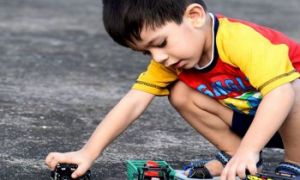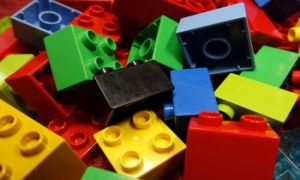Pretend play is the acting out of stories by children that involves make-believe characters, emotions and situations. Developmental psychologists believe that children begin to engage in pretend play from around two years and it goes on to mark an important stage in development of the child as they learn to think in abstract terms.
Here are a few more ways that pretend play can be a powerful aid to the overall growth of children.
Helps Physical Development
Pretend play involves action and movement, encouraging children to use their hands, legs and different sense organs. As they imagine themselves to be firefighters, children are likely to climb ladders and slide down chutes even as being an aeroplane can send them running and whirring through make-believe clouds. Likewise setting up a tea party can build fine motor skills as children use their hands and fingers to dress up their dolls and lay out the table.
Nurtures Creativity
Best of all, pretend play allows children to range through their imagination building stories, creating settings and acting out roles. They test out new situations and explore trajectories of their own making. As educators, ensure that you have play areas equipped with enough material like paint, fabrics, play-dough, sand and blank papers as well. For example if a child is interested in play-dough, at first have them to make familiar objects like a bowl for their dog or a veggie for supper. Later encourage them to mould more complex shapes like furniture for a doll house or animals in the zoo.
Fosters Social Skills
Pretend play offers major opportunities for children to learn and practise a variety of social skills. As they imagine to be different people or use a various objects, they learn to adopt multiple perspectives. They explore how another person or being may feel and behave in a given situation. And since make believe games usually involve others as well, children learn to work with peers through cooperation, negotiation and taking turns. Support your young learners by keeping play fun and in the beginning at least, simple. Play together face to face so children can copy your gestures and pretend actions before they become assured enough to develop their own.
Strengthens Critical Thinking
Pretend play lets children make new connections, like with an object they have at hand and an imaginary character. Help the process along by showing them how to link ideas together so if a child likes pretend being a helicopter, take them to a bird park. Also such play offers ample opportunities like pretend earthquakes and ET landings to plan courses of action and solve problems.
Symbolic Thinking
Children become ready to pretend play when they can think about things as separate from the objects they represent. So a child may use a log – which is a part of a tree – to assign to it another meaning, that of a flying transport. Thus pretend play marks the emergence of abstract or symbolic thought which in turn creates the foundations for language and complex cognition.
As children act out roles, they develop many skills. They play cooperatively; negotiate turns, exchange ideas and work together to solve problems, The following article lists some suggested learning objectives that support a child's overall development.
Benefits Of Home Corner
Pretend play is very important for children's development and learning. Children can take on and try out roles from familiar family scenes, the local community's experiences and imaginative fantasies.
Reference:
The Need Of Pretend Play In Child Development, Psychology Today



 As an Educator in Australia, your pay rate falls under the Children’s Services Award 2010. This award states the minimum amount that an employer can
As an Educator in Australia, your pay rate falls under the Children’s Services Award 2010. This award states the minimum amount that an employer can When working as a qualified Early Childhood Teacher (with a university degree) within a service, your rate of pay will come from the Educational Services
When working as a qualified Early Childhood Teacher (with a university degree) within a service, your rate of pay will come from the Educational Services When working as a Diploma Qualified Educator your pay rate is from the Children's Services Award 2010. This Award states your minimum rate of pay
When working as a Diploma Qualified Educator your pay rate is from the Children's Services Award 2010. This Award states your minimum rate of pay When working as a Cert 3 Qualified Educator, your pay rate is from the Children's Services Award 2010. This Award states your minimum rate of
When working as a Cert 3 Qualified Educator, your pay rate is from the Children's Services Award 2010. This Award states your minimum rate of Educational Leaders play a crucial role in their early childhood service by ensuring that the educational program aligns with best practices and supports the holistic
Educational Leaders play a crucial role in their early childhood service by ensuring that the educational program aligns with best practices and supports the holistic In early childhood education and care, ratios are more than a technicality—they are a frontline safeguard. Every child deserves responsive supervision, emotional connection, and developmental
In early childhood education and care, ratios are more than a technicality—they are a frontline safeguard. Every child deserves responsive supervision, emotional connection, and developmental With the new national child safety reforms kicking in on 1 September 2025, early childhood services like yours have a real opportunity to lead the
With the new national child safety reforms kicking in on 1 September 2025, early childhood services like yours have a real opportunity to lead the Here’s a comprehensive Mobile Phone and Smart Watch Policy tailored for early childhood education and care (ECEC) services in Australia, aligned with the latest 2025
Here’s a comprehensive Mobile Phone and Smart Watch Policy tailored for early childhood education and care (ECEC) services in Australia, aligned with the latest 2025 The Sea of Fish Challenge is a national initiative that invites children, educators, families, and communities to create and display fish artworks as a symbol
The Sea of Fish Challenge is a national initiative that invites children, educators, families, and communities to create and display fish artworks as a symbol Across the early childhood education and care sector, educators are sounding the alarm: current staffing ratios are insufficient to deliver safe, meaningful, and developmentally appropriate
Across the early childhood education and care sector, educators are sounding the alarm: current staffing ratios are insufficient to deliver safe, meaningful, and developmentally appropriate


